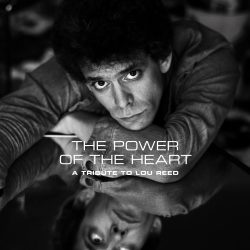A career spanning tribute by artists spanning various musical genres.
 Tribute albums are as old as long-playing records themselves, and as you can imagine, their quality has been extremely variable over the decades. The best ones are when the artists covering the tracks bring their own take to the songs of an artist who has materially influenced their own music, and in that way, they enhance their own music and bring new insight to the artist who is the subject of the tribute. The challenge of recording a successful tribute album gets even more difficult when your subject is a truly iconic artist where it is difficult to separate the original performance from the songs themselves. This was the challenge facing Bill Bentley when he decided to pull together ‘The Power of the Heart: A Tribute to Lou Reed’. To be fair, he does have experience producing tribute albums having done so for Roky Erickson, Doug Sahm and Skip Spence, and he has worked with Lou Reed who also became a personal friend.
Tribute albums are as old as long-playing records themselves, and as you can imagine, their quality has been extremely variable over the decades. The best ones are when the artists covering the tracks bring their own take to the songs of an artist who has materially influenced their own music, and in that way, they enhance their own music and bring new insight to the artist who is the subject of the tribute. The challenge of recording a successful tribute album gets even more difficult when your subject is a truly iconic artist where it is difficult to separate the original performance from the songs themselves. This was the challenge facing Bill Bentley when he decided to pull together ‘The Power of the Heart: A Tribute to Lou Reed’. To be fair, he does have experience producing tribute albums having done so for Roky Erickson, Doug Sahm and Skip Spence, and he has worked with Lou Reed who also became a personal friend.
Bentley had two major objectives for the tribute, first the songs had to cover all of Lou Reed’s career, not just the critically acclaimed periods, and all the artists needed to have been fans of, and influenced by, Reed. The lead single and track on the album is Keith Richards’ version of ‘I’m Waiting for the Man’. Lou Reed was 24 when he wrote the song in 1966 and Richards was 80 when he recorded his version, and it is difficult to determine on the evidence of this recording who influenced who. Richards brings his lifetime of experience to one of rock music’s greatest and most influential songs and reminds us there is more to him than just his day job. If you had to draw up a shortlist of who should record another cover of ‘Perfect Day’ then Rufus Wainwright would be near the top. Mick Ronson’s piano and string arrangements on the original version are forgotten, as Wainwright focuses on his vocals, and is joined by Madison Cunningham on vocals and guitar with a take that is much closer to Reed’s own version included on ‘Perfect Night: Live In London’. Lou Reed was a Jazz fan, and Rickie Lee Jones takes ‘Walk On The Wild Side’ to New Orleans but this version is based on New Orleans piano, with drums, percussion and a violin and significantly there is no bass. Rickie Lee Jones reconstructs Reed’s biggest hit while retaining its original spirit, clear evidence of her uniqueness as an artist.
Mary Gauthier plays it straight on her version of ‘Coney Island Baby’, Reed’s nostalgic look back at youth to try and understand today, emphasising just how much influence Reed’s lyrics and his approach to melody had on her younger self, inspiring her to pursue her own career like many other aspiring singer-songwriters. Lou Reed himself suggested that ‘Legendary Hearts’ would suit Lucinda Williams after Hal Willner arranged for him to join her on stage at a New York show. Unfortunately, Reed didn’t make the gig, but he was right that the song was perfect for Lucinda William’s vocals on the mature Reed’s exploration of personal love. The maturing Lou Reed of the ‘80s was the subject of very mixed reviews by the critics, but Lucinda William’s version shows what a great song ‘Legendary Hearts’ really is, and how her powers as a great vocalist are unimpaired. 1989’s ‘New York’ saw Reed being rehabilitated as a darling of the critics, but he followed this triumph with 1992’s ‘Magic and Loss’, a concept album about death and loss, which unsurprisingly got mixed reviews as some critics struggled with the concept. Rosanne Cash is an artist who has followed her own artistic path, and she recognised the fearlessness in Lou Reed’s approach to his own music. Her version of ‘Magician’ from ‘Magic and Loss’ matches her vocals with a backing track played by John Leventhal that keeps the poignancy of the original but brings a more pronounced sense of the blues and country heartache to the fore.
Maxim Ludwig & Angel Olson, Joan Jet, Bobby Rush, The Afghan Whigs, and Automatic also bring their take on Lou Reed’s song catalogue and maintain a sense of respect and exploration in their versions of Lou Reed’s songs. Bill Bentley has ensured that the packaging, including photographs and detailed liner notes, enhances the overall experience of listening to new takes on Reed’s songs from all stages of his career. Lou Reed is such a stylised performer that there will always be those who prefer Reed’s own versions of his songs to any cover versions, but ‘The Power of the Heart: A Tribute to Lou Reed’ gives clear evidence of the depth of Reed’s influence on other artists, and gives listeners new insights into some of his best songs.


